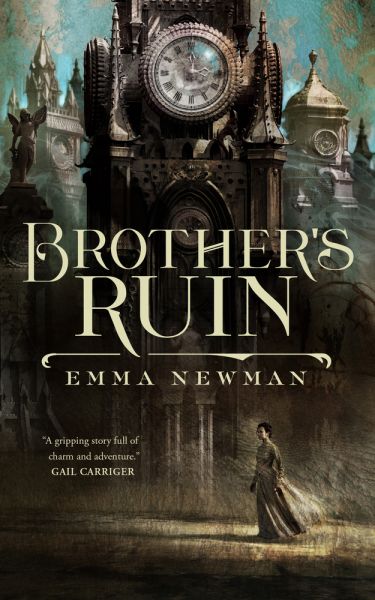The Game Commences
Brother’s Ruin (Industrial Magic, volume 1)
By Emma Newman

25 Mar, 2017
0 comments
Emma Newman’s Brother’s Ruin is an amiable introduction to her Industrial Magic gas-lamp fantasyseries.
Great Britain’s power and prosperity rests on the talents of the Society for Esoteric Arts. Accordingly, the Society has been granted the legal powers it needs to ensure its continued existence. This includes the right to impress any person with magical talents into the Society, even if the candidate, or the candidate’s family, object to the conscription.
Losing a family member to the Society is not necessarily bad. The Society compensates the candidate’s family. This compensation would be a godsend to the Gunn family, which is struggling with mounting debts. Benjamin Gunn, aspiring mage, might be able to save his family. There is one problem: the Society pays in proportion to the prospective mage’s talents. Although he has some magical ability, Benjamin is a comparative lightweight. It’s his sister Charlotte who has the stupendous talent … and she is determined not to be conscripted. It would be much more convenient if Benjamin were the one to be press-ganged. Now, if there were only a way that Benjamin’s talents could be augmented to increase his compensation …
Charlotte has a cunning plan.
While the Society knows that people have tried, and will continue to try, to fudge the aptitude tests, they appear to have dismissed the possibility that that one person might deliberately cheat on another person’s behalf. Charlotte can help her brother to an impressive score on the entrance tests. But what will happen once Charlotte is not there to boost her brother’s abilities?
That is not the only problem facing the Gunns. Benjamin’s father has gone deeply into debt to pay for Benjamin’s education and is finding it impossible keep up the loan payments. The lenders (predatory loan sharks) are in league with a Society mage. If Mr. Gunn cannot pay, he faces more than kneecap damage. People who default payments to these particular lenders have a deplorable tendency to die of sudden heart attacks.
If Charlotte were to call official attention to the activities of the loan sharks’ mage, the Society would use its considerable clout to protect its reputation, quashing the charges and disappearing any witnesses. If she is to save her family, Charlotte will have to deal with the loan sharks herself.
~oOo~
If there is one thing we can learn from British mysteries about the British justice system, it is that it depends almost solely on amateur sleuths. From maiden aunt pensioners to emotionally volatile aristocrats, from Bletchley Park discards to adolescent poisoners, from intrepid fallen women to the royals themselves, the gifted hobbyist is the linchpin of the system. One wonders if this is because Britain is oddly well supplied with people with time to kill and a talent for snooping, or because (if we are are to trust the novels) British police are either corrupt or incompetent … or both.
But the system as depicted seems to work well enough. Except, ha ha, for the people who are killed to motivate the amateur detectives. Can’t break eggs without making an omelette.
Mid-19th century Britain’s grudging acknowledgement that women are as adept at magic as men would normally be liberating for women characters. Charlotte has no hankering for the isolated life of the magical adept. She has artistic talents, which she hopes to develop. She plans to marry a suitable young man, when a sufficiently appealing candidate appears. She’ll choose her own life, thank you.
I experienced this book as a pleasant diversion, which surprised me, given that the setting looks rather grim from anything other than a white male upper-class Brit standpoint. Women are second-class citizens, the rich prey upon the poor, the powerful arrange the law to suit themselves and use their influence to cover up offenses too egregious for legalization. Families teeter on the edge of insolvency, with debtor’s prison and much worse waiting for the foolish and unlucky. It’s a world where it is very easy for life to go horribly wrong.
Two things may account for my reaction:
- Charlotte is a pleasant character in whose company to spend a story.
- She’s pursuing reasonable, moral life goals that can actually be achieved in her world. This is a contrast to the previous works by the same author, works in which bitter disappointment is joined to disquieting revelations. Context is all.
Brother’s Ruin is available here (Amazon) and here (Chapters-Indigo).
